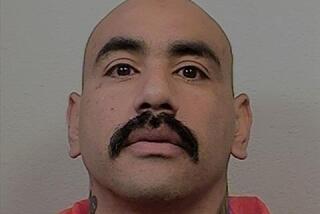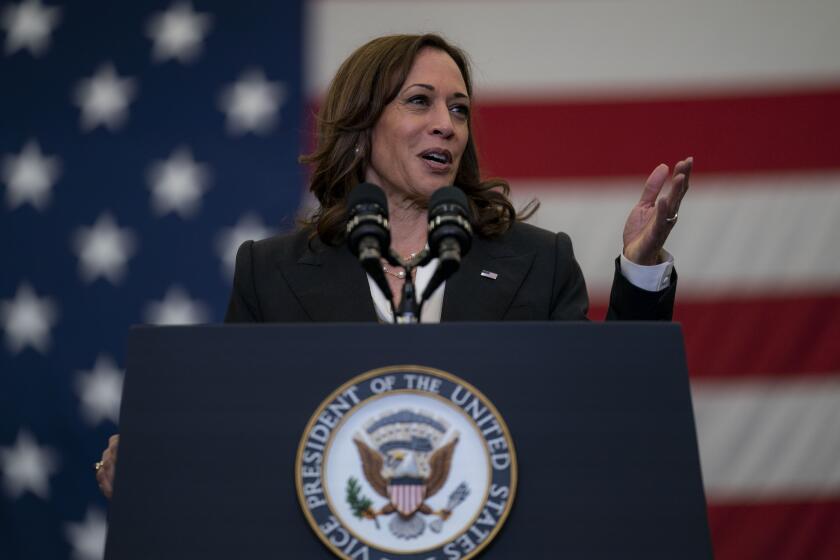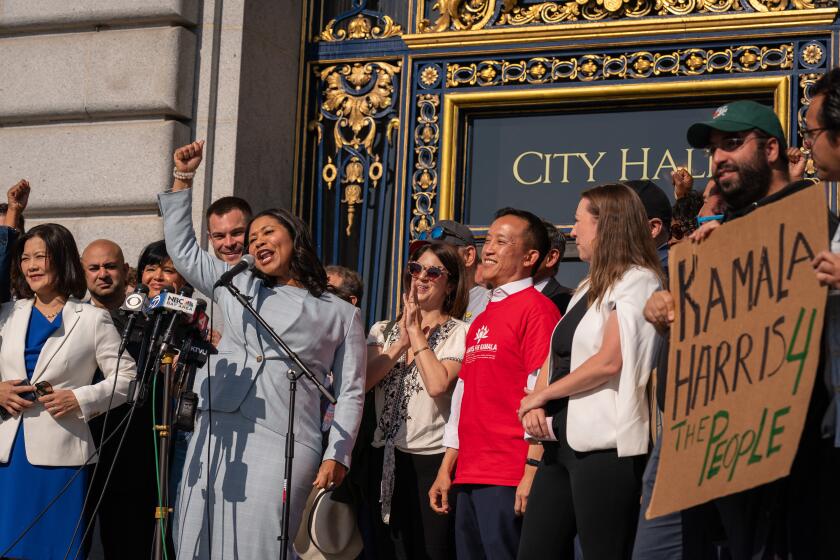With Block’s Death, It’s Baca or Let the Supervisors Decide
The race for Los Angeles County sheriff has taken a strange, virtually surreal turn since incumbent Sherman Block collapsed in the bathtub with a brain hemorrhage Oct. 24.
The 74-year-old Block underwent surgery to remove a golf-ball-sized blood clot from deep within his brain Monday and died of a massive and continuing brain hemorrhage Thursday evening.
Still, his campaign is pressing on--claiming that the sheriff asked his consultants and volunteers to continue the race against challenger Lee Baca. And one thing is clear: Block’s intimates remain firmly united by their personal debt to him and their mutual distaste for Baca, who forced the sheriff into a taxing runoff campaign.
Voters, then, are faced with an odd decision: whether to vote for a candidate who now exists only as a name on the ballot or to elect the first sheriff in 75 years to take office without the support of the county’s political establishment. In essence, Block’s campaign now is asking the electorate to vote its proxies to the Board of Supervisors, who under law would select the next sheriff if Block wins the election in death.
This new dynamic--the conversion of electoral politics into something akin to a corporate proxy fight--adds to the novelty of an already peculiar electoral contest, one that even before the sheriff’s illness had become the biggest little election in town.
The race between Block, a four-term incumbent, and Baca, a retired sheriff’s chief whose primary base of support is in the Latino and, to a degree, Asian communities, has had all the elements of a big-time contest: millions of dollars in expenditures, floods of slate mailers, and a prize that happens to be the highest-paid elective office in the United States.
But the truth is that the race itself has been supremely--again, almost surreally--small from the beginning.
Particularly in the days before the long-ailing sheriff’s final illness, it had all the nastiness of a very, very local contest, including reams of hit faxes and unsigned letters from “concerned members of the department,” and, until Block’s collapse last weekend, about as much visibility.
Big-Picture Themes
At work, to a large degree, have been classic, big-picture themes that have come to characterize a number of California political contests in recent years. It would be tempting, for example, and not at all wrong, to view the race through the prism of California’s shifting demographics, and Baca, who is Mexican American, as a rising ethnic politician at a time when the region’s Latino voters are forming strong alliances and making their presence felt in political circles.
In the hours after Block’s death, there already were signs that some of the more ambitious officeholders who had endorsed him, when history seemed to assure his reelection, were looking for ways to appear, if not close to Baca, at least not antagonistic.
As one political observer put it: “Nobody with any concern for their political future in this county would want people to look back and remember that there was a time when they would rather see a dead man elected than a Latino. That’s unfair, but I guarantee somebody will say it.”
It would also be perfectly appropriate to view the race as a referendum on Block’s long stewardship. He was a card-carrying member of Los Angeles County’s old political guard. His supporters were and are the traditional Westside/Valley voting bloc that usually dominates local elections, including the region’s labor bosses and a few Hollywood types. But voters seeking to decide whether to elect Baca or give their proxy vote to the five county supervisors may also look to that smaller side of this strange race: Baca’s hands tremble as he answers questions in a televised debate. When confronted about issuing conflicting statements on a serious charge leveled by Block, he tells a reporter that her pregnancy has affected her brain.
Supervisors Mum
The supervisors meanwhile have been constrained in discussing who they might regard as an appropriate successor to Block, if the voters delegate the decision to them. The conventional opinion in the County Hall of Administration is that if the choice falls to the supervisors, the most likely choice would be someone from within the current departmental command structure. In that case, the most frequently mentioned front-runner is Assistant Sheriff Mike Graham. On the other hand, if the lawmakers decide to go outside the department, former Los Angeles Deputy Police Chief Mark Kroeker is widely regarded as the leading prospect. It is not certain, however, that they would be the only contenders. Privately, several sources close to the supervisors have bemoaned the fact that Block’s decision to seek reelection prevented younger and promising prospects to put themselves forward because they were unwilling to oppose the powerful and personally popular sheriff.
That’s one reason neither Block’s nor Baca’s endorsements can be taken totally at face value.
Baca has won support from leading Latino politicians such as California Assembly Speaker Antonio Villaraigosa and state Sen. Richard G. Polanco, both Los Angeles Democrats. But neither forwarded money for his campaign chest or came to the area to stump in the general election.
Block--in life and death--has the backing of organized labor, but the rank and file among his own deputies have made it clear that they are deeply divided in their loyalties.
On the stump, at the campaign fund-raisers and during the five post-primary debates, such little inconsistencies kept bubbling up.
They are small things, generally not important enough to make the evening news.
But in the voting booth, they may be crucial, though not as crucial as the fact that only one of the candidates is still alive.
More to Read
Sign up for Essential California
The most important California stories and recommendations in your inbox every morning.
You may occasionally receive promotional content from the Los Angeles Times.






